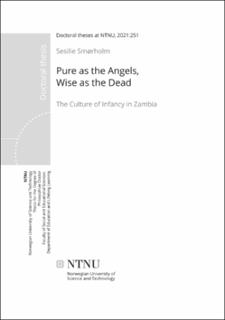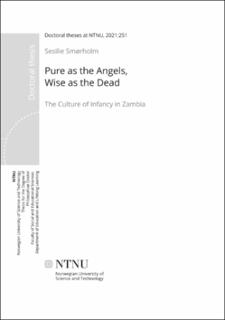| dc.contributor.advisor | Kjørholt, Anne-Trine | |
| dc.contributor.author | Smørholm, Sesilie | |
| dc.date.accessioned | 2021-11-10T14:14:39Z | |
| dc.date.available | 2021-11-10T14:14:39Z | |
| dc.date.issued | 2021 | |
| dc.identifier.isbn | 978-82-326-5826-8 | |
| dc.identifier.issn | 2703-8084 | |
| dc.identifier.uri | https://hdl.handle.net/11250/2828918 | |
| dc.description.abstract | This dissertation offers an ethnographic description of the everyday life of babies and their caregivers in Ng’ombe Township, which is a poor neighbourhood in Lusaka, Zambia. In particular, it describes how parents understand and ensure the well-being and development of their babies. Similar to parents in the rest of the world, they play close attention to how the child gradually develops and becomes stronger, and they worry if the child does not seem to develop as other children.
The dissertation also demonstrates that there are great cultural variations in how people understand babies' bodies and sociality. In Ng’ombe Township, each baby is said to be born with an ancestral spirit and newly born babies are seen as pure and innocent spiritual beings who are closer to the world of the dead than the world of the living. They possess other insights than adults. As such, they are, as expressed by a senior community member, “pure as the angels” and have “the wisdom of the dead” (article 2). As they grow and start paying more attention to their mother, they gradually become social members of the community of the living, a process that is marked by several rituals (article 1, 2 and 3).
Newborn babies are, to use Victor Turner's terminology, seen as liminal persons who are "betwixt and between" the world of the dead and the world of the living. This thesis describes how parents in Ng’ombe, who on a day-to-day basis face challenges of meeting their children’s basic needs of food and medication, struggle to keep their babies alive. It also describes how mothers and older siblings mourn the loss of babies who leave the world too early (article 3 and 4).
By describing how people in Ng’ombe understand young children’s bodies and sociality, I aim to challenge narrow definitions of children’s “nature” and “needs” and contribute to a more culturally sensitive understanding of young children’s development. As part of this, I also wish to demonstrate how notions of “good childhood” and “good parenthood” varies both within and between cultures and populations. | en_US |
| dc.description.abstract | Sammendrag
Denne avhandlingen byr på at etnografisk studie av hverdagslivet til babyer og deres omsorgspersoner i Ng’ombe, som er en fattig bydel i Lusaka, Zambia. Avhandlingen fokuserer særlig på hvordan foreldre i Ng’ombe forstår og trygger babyers velvære og utvikling. I likhet med foreldre i andre deler av verden så følger de nøye med på hvordan barnet gradvis utvikler seg og blir sterkere, og de bekymrer seg om barnet ikke ser ut til å utvikle seg som andre barn.
Avhandlingen demonstrerer også at det er store kulturelle variasjoner i hvordan folk forstår babyers kropp og sosialitet. I Ng’ombe sies det at hvert barn er født med en forfedreånd. Dette gjør at de besitter en annen kunnskap og innsikt enn voksne, og står nærmere Gud og engler. De er, som en eldre kvinne uttrykte, «pure as the angels» og «wise as the dead» (artikkel 2). I løpet av de første ukene av livet vil babyen gradvis bli en større del av det sosiale livet til familien og samfunnet, en prosess som blir markert i en rekke overgagsritualer (artikkel 1, 2 og 3).
Nyfødte babyer blir, for å bruke Victor Turners terminologi, sett på som liminale personer som befinner «betwixt and between» to verdener. Foreldre vet at disse barna er ekstremt sårbare og de kjemper en daglig kamp for å dekke sine barns behov for mat og medisiner. I avhandlingen beskriver jeg også hvordan foreldre som mister et barn fortolker og håndterer tapet, og hvordan familie og andre samfunnsmedlemmer tar vare på dem, og guider dem i sorgen (artikkel 3 og 4).
Ved å beskrive hvordan folk i Ng’ombe forstår små barns kropp og sosialitet så ønsker jeg å utfordre snevre definisjoner av hva som er barns «natur» og «behov», og bidra til en mer kultursensitiv forståelse av små barns utvikling. Som del av dette har jeg også hatt som mål å demonstrere hvordan forestillinger om en «god barndom» og en "god forelder" varierer både innen og imellom kulturer og befolkningsgrupper. | en_US |
| dc.language.iso | eng | en_US |
| dc.publisher | NTNU | en_US |
| dc.relation.ispartofseries | Doctoral theses at NTNU;2021:251 | |
| dc.relation.haspart | Article 1:
Smørholm, Sesilie.
Persons in the Making: Perceptions of the Beginning of Life in a Zambian Community | en_US |
| dc.relation.haspart | Article 2: Smørholm, Sesilie. Pure as the angels, wise as the dead: Perceptions of infants’ agency in a Zambian community. Childhood 2016 ;Volum 23.(3) s. 348-361 https://doi.org/10.1177/0907568216644032 | en_US |
| dc.relation.haspart | Article 3: Smørholm, Sesilie. Suffering Peacefully: Perceptions of Infancy Death in Contemporary Zambia. Ethos: Journal of the Society for Psychological Anthropology 2016 ;Volum 44.(3) s. 333-351 https://doi.org/10.1111/etho.12126 | en_US |
| dc.relation.haspart | Paper 4:
Smørholm, Sesilie; Simonsen, Jan Ketil.
Children’s Drawings in Ethnographic Explorations: Analysis and Interpretations. I: Methodological Approaches, Geographies of Children and Young People. https://doi.org/10.1007/978-981-4585-89-7_23-1 | |
| dc.title | Pure as the Angels, Wise as the Dead -The culture of infancy in Zambia | en_US |
| dc.type | Doctoral thesis | en_US |
| dc.subject.nsi | VDP::Social science: 200::Education: 280 | en_US |

